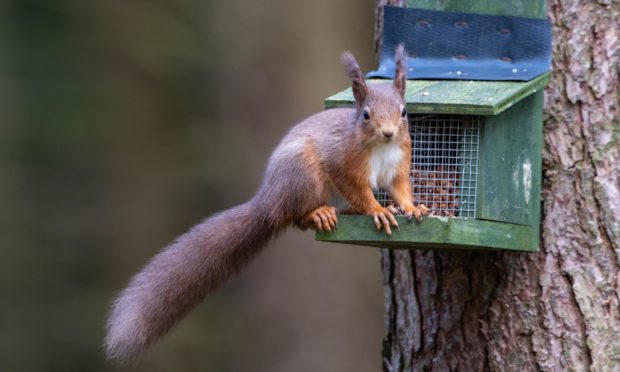Campaigners believe that putting red squirrels “on a diet” could help the population flourish in the north-east.
Aberdeen City Council’s ranger service is teaming up with the Carnie Woods Community Group and Scottish Wildlife Trust’s Saving Scotland’s Red Squirrel Project to form the plans.
They believe that red squirrels are unlikely to venture across the region if they are being too well-fed by human hand in the woodland area at Westhill they currently call home.
The Carnie Woods group has now organised a rota of volunteers to put out ever-decreasing portions of food out for the squirrels over the next nine months.
It is hoped that, by the end of the project, the squirrels will no longer be reliant on their human helpers for sustenance.
Saving Scotland’s Red Squirrel Project, who are working to recover the city’s red squirrel population, have advised a “diet plan” for the scheme.
It’s hoped this will ultimately encourage some of the squirrels to move into new areas around Westhill and Aberdeen.
Countryside officer for Aberdeen City Council, Ian Talboys, said the animals were being fed too much “supplementary” food at present, which could increase the risk of disease transmission and inbreeding within the population as they stay in the one place.
Mr Talboys said: “Squirrels from outwith the woodland are unlikely to move into an over-full territory to add genetic variation.
“Likewise, the resident red squirrels are unlikely to spread to other areas if they have an abundant, easy to access food source.
“The woodland is diverse enough to support a population of red squirrels and a wide variety of birds and other animals.”
Emma Sheehy, a conservation officer for Saving Scotland’s Red Squirrels, said the proposed scheme is tailored to meet the specific needs of the Carnie Woods habitat.
She added: “As part of this programme, the large table-like feeding stations will be removed and replaced with squirrel feeding boxes and bird feeders hung in trees.
“This will help to reduce availability of the food and reduce the risk or attracting large numbers of less welcome species, including rats, which are starting to be an issue for nearby householders, causing damage to properties and posing potential health risks to people and their pets.”
Signage will be posted around the woods asking visitors not to put out additional food.
The signs will also ask people to contact the group if they’d like to be involved.
